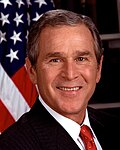| |||||||||||||||||||||||||
| |||||||||||||||||||||||||
| Elections in Missouri |
|---|
 |
The 2000 Missouri Republican presidential primary on March 7, 2000, determined the recipient of the state's 35 delegates to the Republican National Convention in the process to elect the 43rd president of the United States. It was an open primary. [1] The primary marked the end of Missouri's use of the caucus system, which it had used almost exclusively until 2000. [2] Missouri's primary was held on Super Tuesday, alongside fifteen other states. [3]


